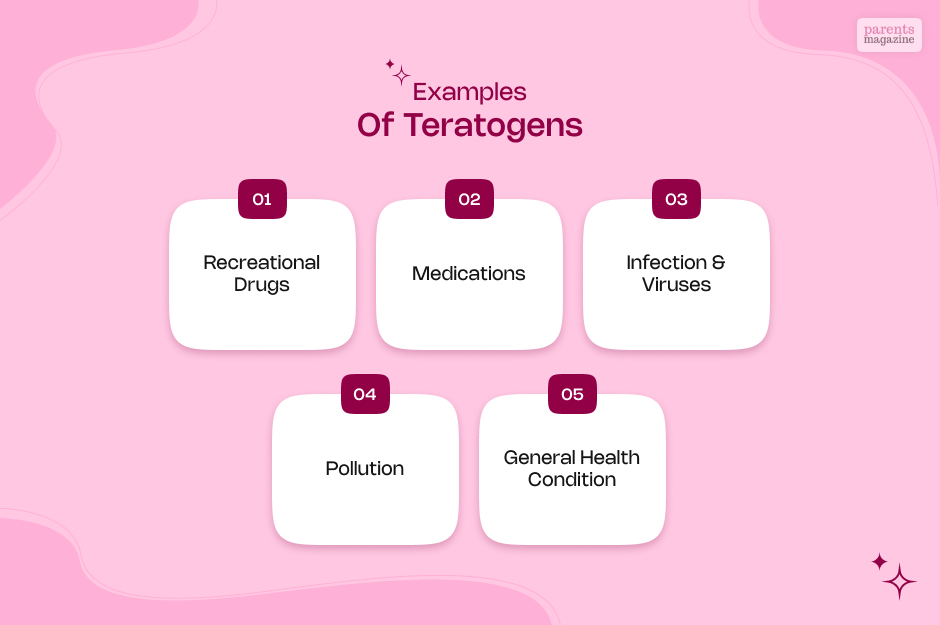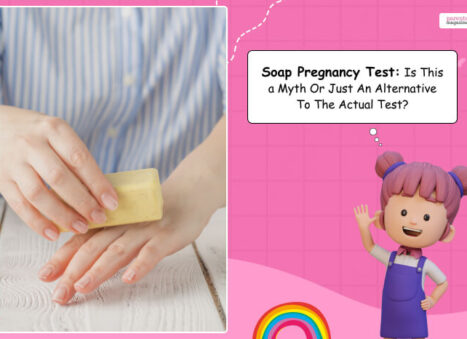
A New Mother’s Guide To Avoiding Teratogens
Teratogens are not the best news for young mothers. They can lead to drastic congenital disabilities in your baby. As a result, it is important for young mothers to know more about them and how to avoid them. Scroll down to read more.
What Are Teratogens
Pregnancy is a beautiful journey. It is the power of creation itself. It is one of the most important things that drives human civilization forward. However, pregnancy is not a rose-laden pathway. It is a tough and long road filled with several challenges. One such challenge is teratology or teratogens.
Medically speaking, teratogens are elements that can result in prenatal defects. Exposure to teratogens at a young age leads to a myriad of mental as well as physical defects. Teratogens can affect your baby as early as 10 or 14 days old. Therefore, having a clear idea about teratogens is very important.
As per medical records, teratogens start interacting at around the third or fourth week of the gestation period. The worst part about teratogens is that they remain undetectable unless you are engaging in behavioral teratogenic behavior.
Examples Of Teratogens

Medical science has progressed a lot in recent years. However, medical practitioners seem to be at an impasse when it comes to the true nature of teratogens. The earliest teratology tests tried studying the phenomenon across animals. As a result, scientists researched small rodents and animals. However, these tests needed to be revised.
Fast forward a few years, and scientists finally had the chance to study teratology on humans. This helped scientists to understand the nature of the phenomenon. Here are some of the most prominent teratogens that you need to shield your babies from.
Recreational Drugs
Recreational drugs are not the worst. They are certainly good fun. However, pregnancy changes everything. I am telling you what is right for you. However, it would help if you stayed away from recreational drugs when you are pregnant.
Alcohol has the potential to interfere with your baby’s (fetus) central nervous system. Studies show that alcohol has the power to mutate certain aspects of fetal growth. This is called fetal alcohol syndrome and can cause facial and physical deformities like a small head, underdeveloped limbs, etc.
On the other hand, cigarettes interfere with your baby’s overall growth. Some of the most prominent cigarette growth issues include premature birth, miscarriage, failing pulmonary functions, underdeveloped brain, and stunted growth.
Finally, the usage of substances like marijuana, cocaine, methamphetamine, etc can also have concerning effects on your baby. One of the most prominent effects of recreational drug abuse in pregnancy is neonatal abstinence. This is when a baby goes through withdrawal syndrome after birth. This is a rare teratogen effect that only affects 5% of the population.
Medications
Over-the-counter medicines work. They do not require a prescription, they are cheap, and they can be bought under the radar. However, you might want to reconsider once you are pregnant.
Over-the-counter medications are said to be one of the leading causes of prenatal deformities in children. Most OTC medicines are made using questionable materials and methods because they do not have to pass any regulations.
In fact, research was conducted to study the composition of different OTC medications. Researchers found traces of microplastic, heavy metals, and other pollutants in these medicines. In fact, this trend was noticed across test subjects.
Some of the most teratogenic medications include:
- Hormonal medication
- Vitamin A supplements
- Antithyroid medications
- Blood thinners or anticoagulants
- Antimicrobials
- Antiepileptic drugs or AEDs
Hence, do not gravitate towards OTC medicines for the sake of your baby. Only go for prescribed medication sourced from an established supplier.
Infection & Viruses
The definition of the term teratogens is not an easy one. In fact, the list is getting longer by the minute. Earlier, synthetic chemicals and substances were thought to be primary teratogens.
However, the aforementioned notions changed over time. Nowadays, doctors have gone out of their way to identify some organic teratogens. These organic teratogens include viruses and bacteria.
Here are some of the most prominent organic teratogens that you need to know about:
- Toxoplasmosis
- Listeria
- Sexually Transmitted Infections
- Rubella
- Herpes Simplex
- Syphilis
- HIV
- Fifth disease
- Hepatitis B, C, and other variants
Pollution
With time, science is expanding its definition of teratogens. In fact, the debilitating environmental conditions are expanding this definition. Certain congenital abnormalities are caused due to pollutants like heavy metals, microplastics, etc.
Some of the most common congenital defects due to pollution include Spina Bifida, neurological debilitation, cleft palate, etc. Here are some of the most common environmental causes include:
- High carbon content in the air
- Prolonged exposure to radiation
- Unchecked rise in temperature
- Microplastic particles in the air
In my opinion, pollution is one of the most dangerous teratogens in existence. As teratogen levels are rising, mothers are becoming more and more susceptible to this. The worst part is that there is no way to combat this. There is only prevention.
General Health Condition
A mother’s general health also needs to be factored in while studying teratology. Some chronic illnesses might result in congenital defects. These defects are not hereditary. Instead, these defects are caused due to the overall health of the host body.
Some of the most prominent chronic illnesses that result in teratogenic defects include diabetes, autoimmune disease, arthritis, lupus, thyroid, etc. However, this statement must not be taken as an ultimatum.
There is no scientific proof that the aforementioned diseases would certainly result in congenital defects in your baby. These diseases simply increase the chance of developing such diseases. Therefore, you must not panic.
Teratogens Exposure Risk Timeframe
Exposure to teratogens exposure starts quite early. Scientists believe that a fetus can be affected by teratogens as early as 1 week after conception. However, you do not panic.
As per the latest reports, teratogens can affect a fetus for the first eight weeks of conception. In fact, doctors suggest that a mother needs to be extra careful from the fifth week to the eighth week. This is primarily because a fetus stays in the developing stage for the first eight weeks. As a result, it is easy for teratogens to interfere with this process.
Hence, it is very important for mothers to stay in touch with their OBGYN during the first few weeks of pregnancy.
Precautions Against Teratogens
The current environmental situation has made it difficult for mothers to avoid teratogens. However, they can certainly try their best to curb the exposure. Then again, this is not a simple task. Avoiding teratogens is one of the most important aspects of pregnancy. Therefore, to make things easier for young mothers, here is a simple cheat sheet to avoid teratogens during pregnancy:
- Keep an open channel of conversation with your OBGYN.
- Avoid indulging in recreational usage of drugs and psychoactive substances.
- Do not take supplements or medications without a prior second opinion from your doctor.
- Make your husband clean the litter box.
- Do not go into heated pools, saunas, spas, etc. They rapidly change your temperature.
- Try to incorporate organic food into your diet.
- Stay away from AC vents or any other variants of exhausts. These emit harmful materials like heavy metals and microplastics.
How is Medication Rated for Safety During Pregnancy?
The FDA has a system to categorize and choose medicines for safety when given to women during pregnancy. The FDA has a five-group categorization for A, B, C, D, and X. The effect range goes higher as you move alphabetically forward.
For example, an A-ranked pregnancy medicine has very few risks associated with birth defects. But, if you move to X-rated medicines, those contain the highest risks of birth defects during pregnancy.
FDA ensures that medicines have these markings to help the healthcare providers with a system. These ratings help a healthcare expert suggest safe medicines for pregnant women.
Here’s all you need to know about the categorization –
Category A: This type of medicine has shown no risk of developing fetal defects in pregnant women.
Category B: There’s limited data on this type of medicine and most of the experiment is done on animals.
Category C: There isn’t a hundred percent surety to rule out the possibility of risk related to fetal defect due to medicines in this category. In most cases, the benefits usually outweigh the risks.
Category D: There is some evidence of fetal risks due to this type of medicine. But, in most cases, the benefits of the same often outweigh the risks.
Category X: This type of medicine has a high risk of fetal defects. Healthcare providers avoid giving these medicines to pregnant women. However, if you are able to identify these medicines, consult with your doctor about whether they are good to consider during pregnancy.
Things to Consider when Taking Medicines During Pregnancy
Always consider a safety check before taking any medicine during pregnancy. You need to determine the potential benefits of having a specific medicine during pregnancy.
Consult Your Doctor
Before taking any medicine, consult your doctor and get help from your healthcare provider. This is important, especially when the potential benefits grow more than the risks.
Newer Labelling System
The FDA adopts a new labeling system. They are now labeling the medicines for pregnancy and lactation. It provides you with more nuanced data about drugs and your safety during pregnancy.
Individual Factors
Also, there are other factors like the dosage of medicine you need to take during pregnancy to keep yourself healthy and safe.
The Closing Thought
And there you have it. You have reached the very end of my article about Teratogens and their implications on your baby’s health. Even though teratogens are bad news for your baby, they can be avoided if you keep a level head. Keep following our page for more such content.
However, if you have any doubts regarding medications during pregnancy, it’s always the best to discuss with your healthcare provider. Meanwhile, keep following our page for more such content.
MORE FOR YOU:
Already have an account?
Sign In
Create your account
User added successfully. Log in









